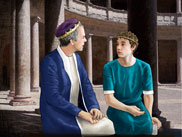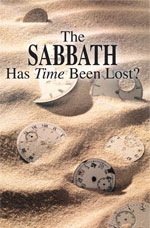By the time the Princess of Cambridge, who is fourth in line of succession to the British throne, turned 1 she had received a cavalcade of gifts from leaders across the globe. They were fitting for her age: silk dolls from China, a snowsuit from Canada, a stuffed dog from the United States, and a baby rattle from Mexico.
All pretty normal, right? Yet take a closer look at the rattle. It was from the American Natural Sapphire Company and made of white gold and studded with diamonds, rubies and sapphires. The estimated value for this item is $44,000. That is quite a chew toy!
Royalty today seem to live on a different planet than us commoners. Try as we might, we can never fully grasp what it feels like to hold such power, prestige, pomp and popularity. Despite this, teenagers living God’s Way have a lot more in common with royalty than it first seems.
Those who grow up as actual princes and princesses live by constant strict rules of conduct. They struggle to fit in with most “normal” people. They are careful to not make mistakes that could give a black eye to their family names. Overall, they have to live their lives at a higher standard than everyone else.
Sound familiar?
Of course, there are additional similarities growing up in Christianity. God’s overall Plan involves training kings and priests to rule when the Kingdom is set up. Revelation 1:6 shows this is the reward for completed saints. In I Peter 2:9, it mentions a “royal priesthood.” Your parents are striving to be a part of this group—and want the same for you!
So, in effect, you are growing up as a royal. Of course, there is one mammoth difference between you and a literal prince or princess. They get to enjoy all the trappings and wealth of a kingdom now—you have to use faith and look forward to the time when you can be a part of the God Family.
This last point means it is hard to keep in mind the goal. Where modern royals have to give up some of their freedoms and choices in order to reign later, their gilded lives help to temper feelings of missing out.
Growing up in God’s Way is all about perspective. Those who view it as a series of “thou shalt nots” run the risk of becoming bitter and bailing out. Those who view it as a life of blessings—while keeping the big picture in mind—are on a path to godly kingship.
The stories in the Bible can help you keep this straight. In fact, the example of King Manasseh, the son of Hezekiah and ruler of Judah, applies directly to the subject at hand. This young monarch’s decisions provide a cautionary tale for all teenagers in the Church.
The Story
King Hezekiah was dying. Isaiah the prophet came to his deathbed and said, “Put your affairs in order. The Eternal has said you will not recover. You will die.”
The king turned to God in prayer, tearfully pleading for more time.
God heard Hezekiah and granted him 15 more years!
Upon learning this, the monarch made his 12-year-old son Manasseh coregent, ruling alongside his father to accelerate the boy’s preparation for kingship. Hezekiah had much to teach, and wished his legacy to be one of righteous obedience to God’s Law.

King Hezekiah named his son Manasseh coregent at age 12 (II Kgs. 21:1) and the two ruled alongside one another for 15 years.
Photo Illustration: Paula C. Rondeau
This is not unlike your parents and you. They know time is short in this age and they are working hard to prepare you for rulership. Whenever their decisions seem strict and rigid, know that they have your best interests in mind. They want the very best future for you!
Back to the story…
During Hezekiah’s reign, he “did that which was right in the sight of the Lord,” “departed not from following Him,” and “kept His commandments.” Hezekiah rid Judah of idol worship, removing high places, breaking false-religious images, and cutting down the pagan groves of fertility goddess Asherah (II Kgs. 18:4-6).
After 15 years of training his son, Hezekiah died as the Eternal had said.
Clearly, your parents are not slated to die when you end your teenage years. But there will come a time when you have to decide for yourself whether to keep God’s Way or head into the world.
How did Manasseh fare after his father died? Upon taking the throne in his late 20s, the new king began a reign marked by idolatrous pursuits. Instead of the ways of God, Manasseh preferred pagan, gentile traditions and rituals. He rebuilt the high places Hezekiah had destroyed, erected altars for Baal worship, and made a wooden image of Asherah and placed it in the Temple. He ignored his father’s instructions about God, worshipping the stars instead—he even built altars for them in the two courts of God’s Temple in Jerusalem! Manasseh pursued witchcraft, cast spells, and dealt with wizards and demons. Worse, Manasseh sacrificed his son as a burnt offering to the god Molech!
This is the most extreme example that reveals a very real danger: dabbling in the world’s ways—or diving in headlong—will always lead to more wrong conduct. Sin begets more sin!
Manasseh clearly did not appreciate his upbringing. As soon as he was able, he jumped at the chance to learn what the world had to offer.
Reap What You Sow
Whenever we break God’s Law, there are consequences. Some of these are immediate, others take time. Obvious examples are premarital sex leading to pregnancy and underage drinking leading to a deadly car wreck.
But usually the bad effect takes time before it appears. Because God does not immediately strike us down when we go against His commands, it can seem like the world’s way is fine. However, there are almost always warning signs that we are going astray. Sometimes those warnings can come from your parents or minister.
The same was true for Manasseh. God sent Isaiah and other prophets to warn Manasseh and condemn the nation’s idolatrous ways (II Kgs. 21:12-15). Through His loyal servants, God said, “Behold, I will bring such calamity upon Jerusalem and Judah that the ears of whoever hears of it will tingle. Jerusalem will be measured by the standard of My word, just as I had done with Samaria and the house of Ahab—and I will wipe Jerusalem as a man wipes a dish and turns it upside down. I will forsake My people, the remnant of My inheritance, and will deliver them into the hand of their enemies. They shall become a prey—a spoil to be plundered. For ever since I brought them out of Egypt, they have done evil in My sight and have provoked Me to anger!”
Despite these warnings and God’s great patience, Manasseh and his subjects did not listen or change. Instead, the king persecuted God’s servants, authorizing a vicious killing spree that shed much innocent blood. (Ancient tradition says the king executed the prophet Isaiah, sawing him in two within a hollow log. Hebrews 11:37 may include a reference to this martyrdom.)
As punishment, God moved the king of Assyria to send his army and top officers to arrest Manasseh. They bound the wicked king with bronze chains and led him away with ropes attached to hooks that pierced his lip and nose. The Assyrians took Manasseh to Babylon, which they had conquered after the Babylonians rebelled against them.
Again, this is an extreme example. But realize that the fruits of living in this world are harsh. God’s Way is also difficult, but it produces many blessings and happiness.
Manasseh learned this lesson the hard way. He ended up alone, a prisoner in a faraway land. He was humiliated, removed from his seat of power, and taken away from his family, friends and subjects.
The king suffered torture at the hands of the Assyrians, who dealt harshly with any captured king. (The Assyrians’ treatment of King Zedekiah in II Kings 25:7 shows their vicious brutality. Before taking him away, the Assyrians slaughtered Zedekiah’s sons before him, and then put out the king’s eyes with a spear point or dagger.)
In captivity, Manasseh dwelt on all the evil acts he had committed—which now caused him shame and agony. His despair reminded him of his father Hezekiah’s righteous example, and the times God had delivered his father from trouble (II Kgs. 19:35).
Manasseh humbled himself and tearfully cried out to God in many heartfelt prayers. The Eternal saw that Manasseh had changed his attitude and thinking. He was now humble—willing to obey God and listen to His instruction. God, who is compassionate and loves to show mercy, rescued Manasseh (II Chron. 33:12-13).
To the king’s surprise, the Assyrians released him and sent him home. This miraculous deliverance left no doubt in Manasseh’s mind that the Eternal was indeed the one true God.
Don’t Miss the Lesson!
There is a crucial lesson here for all teenage princes and princesses in the Church today. You may want to “try out” the world and its ways. It can seem like a good idea. You may even think, I will come back later, I just want to experience what everyone else has.
Yet this comes with grave consequences. The end of Manasseh’s story proves this point.
Once the king returned to the throne, he went to work. He removed the foreign gods he had set up in Jerusalem; he took away the idol he had put in the Temple. He got rid of all the pagan altars he had built on the Temple Mount, repaired God’s altar, and restored the practice of offering sacrifices upon it, commanding Judah to serve the Eternal (II Chron. 33:15-16).
But the nation’s response was half-hearted. While Manasseh had deeply repented and was now devoted to serving God, most citizens refused to follow the king’s earnest example.
Of those who responded to Manasseh’s change of heart, most decided to compromise. They had grown used to worshipping at the high places and reasoned that it was okay to use these pagan worship centers as long as sacrifices were to the true God. Their human reasoning was similar to that of people today who keep Christmas, Easter and other pagan holidays, claiming it is “okay” as long as it is done to worship God. But the Eternal Creator and Lawgiver hates this! God expects His people to worship Him His Way!
The king learned a bitter lesson: His long public history of reckless rebellion against God and His Law had ruined the nation’s character. Although he had repented, the people were too far gone to rescue completely. The king realized it is easier to lead, teach and inspire people to obey God by setting the right personal example from the outset, rather than attempting to undo years of idolatry and disobedience against the Eternal.
Despite King Manasseh’s repentant attitude, his previous years of disobedience left Judah with an excuse not to listen.
Your example influences others as well. But there is more to learn from this story. Living sinfully has consequences—often you will never fully be able to rid yourself of them. God will surely forgive any repentant person. But that does not remove the physical effects and emotional scarring that comes from deciding to break God’s Law.
As with Manasseh, even if you do return to God’s truth after “sowing wild oats,” your example could have influenced others to leave as well. They may never come back.
In the end, Manasseh died after 55 years of rulership and was buried at his home in the garden of Uzza. His son Amon inherited the throne of Judah.
The latter years of Manasseh’s life were lost on his son, who served and worshipped idols.
“And [Amon] did that which was evil in the sight of the Lord, as his father Manasseh did” (II Kgs. 21:20-22).
Not all stories have happy endings. This one is bittersweet—but it contains many morals for you to contemplate.
Teenage royals in the Church, realize what you have! Your parents, like King Hezekiah to his son, are teaching you to “do that which is just in the sight of the Lord.” This precious knowledge equips you to be a leader by example—a light in a dark generation.
Follow your parents’ example as they follow God (I Cor. 11:1). Learn from King Manasseh’s mistakes. Appreciate the blessings of God’s Way as you prepare for rulership later.

















